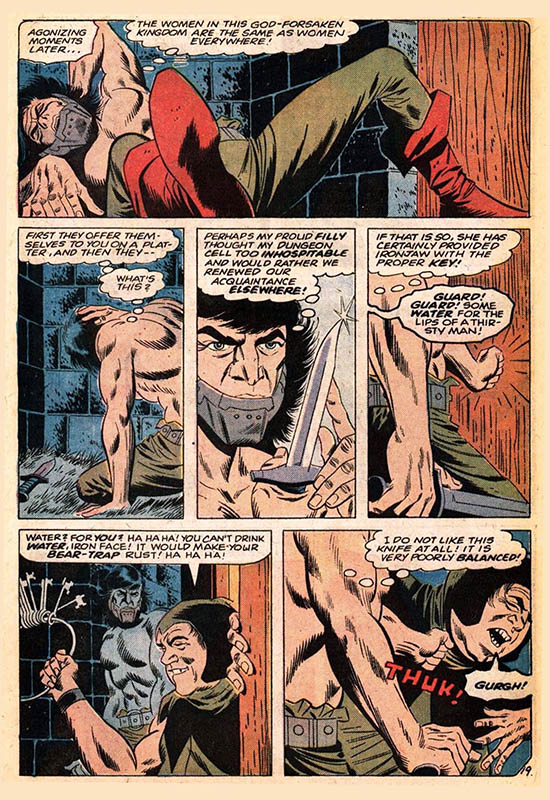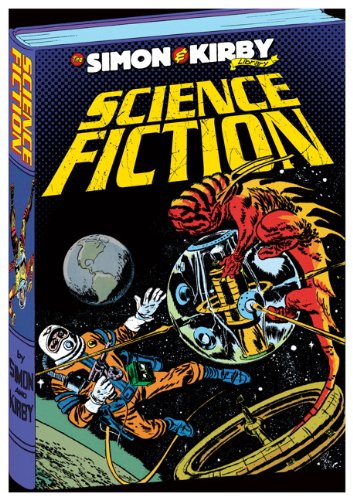
Pages
Saturday, April 29, 2023
Space Heroine Saturdays TARA "Death that Grew!"

Friday, April 28, 2023
Friday Fun NUTS! "Comics is Wonderful!"
Thursday, April 27, 2023
Reading Room VENUS COMICS "Thru the Lens"
Wednesday, April 26, 2023
Wednesday Worlds of Wonder IRONJAW "Saga of IronJaw!" Conclusion
When Last We Left the Embodiment of Toxic Masculinity...
The current usurpers aren't happy with the news and order IronJaw captured ASAP...
And, the writer intended the lead character to be a real asshole...
If you really want to take a look at how polarizing the guy was in the comics/sci-fi community, click HERE!
Warning: it ain't for the faint-hearted!
BTW, Fleisher ended up scripting extended runs of Marvel's Conan the Barbarian color comic and the Savage Sword of Conan b/w magazine from 1981 through 1985 as well as Marvel's comic adaptations of both the Arnold Schwarzenegger Conan movies!
Tuesday, April 25, 2023
Reading Room LOST WORLDS "First Man to Reach the Moon"
Monday, April 24, 2023
Monday Madness ALARMING TALES "I Want to Be a Man!"
Following up on yesterday's guest-post about artificial intelligence...
(which reprints this story, along with a lot of other kool sci-fi by the duo!)
Sunday, April 23, 2023
Artificial Intelligence and Primo Levy (A guest editorial by Mary Ann Albanese, concerned human)
Remember the 1970 film Colossus: the Forbin Project, when Dr. Charles Forbin realizes that he (and the rest of the planet) are now under the “electronic thumb” of his own creation?
Remember, in the 1977 film Demon Seed, when Proteus tells its' creator, Dr. Alex Harris, that it wants "out" of its’ box?
Ever since human beings have seen the tools designed to serve them show signs of taking over, those intelligent machines have frightened us.
It brings back memories of George H. Wells in the 1960 movie Time Machine when he travels to the far future (October 12, 802701, to be specific), and learns that future humans (the Eloi) have lost the ability to read books and learn.
In the 60’s, students who didn’t like to read could buy Cliffs Notes versions of classics, and use those yellow and black covered cheat-sheets to help them write essays.
Today, students use artificial intelligence tools (like ChatGPT) to help them pass classes without actually opening printed or electronic books.
People, like me, who’ve always enjoyed reading for pleasure, are baffled by those who don’t enjoy reading and writing.
Occasionally, it was challenging to write about a book which I hadn’t chosen on my own.
However, then I would just write on why I didn’t like that particular book.
One thing I wonder about is whether students realize that writing an essay helps you to solidify what you think about a subject.
Essays are based on personal viewpoints, not just facts, and the opinions we find on the web are a “cesspool,” as John Oliver put it on his recent 2/26/2023 show about Artificial Intelligence.
(You can view it HERE)
I wonder how a ChatGBT essay would read on whether UFOs exist, or whether William Shakespeare was really Edward de Vere.
In short, I wonder what facts and opinions ChatGBT is ingesting.
What percentage of the material has been fact-checked?
What is the AI system prioritizing?
As John Oliver put it: “The problem with AI right now isn’t that it’s smart; It’s that it’s stupid in ways that we can’t always predict.”
The ChatGPT phenomena reminds me of a short story that I discovered in 2015—"The Versifier” by Italian author Primo Levi (1919-1987).
This science-fiction tale about a machine that composes poetry was first published in English in The Complete Works of Primo Levi, by Liveright Publishing Corporation, a Division of W.W. Norton & Company.
The Versifier story is part of the “Natural Histories” group of short stories in Volume One, and found on pages 417-438.
Before “Il Versificatore” was published in the book Storie Naturali, it was published in Italian in Il Mondo (the Italian newspaper) in 1960.
(Primo Levi began writing down his science fiction stories in the 1940’s.)
“The Versifier” is a fantascienza (the Italian word for science fiction) story, in the form of a play with five characters: The Poet (a male), The Secretary (a female), Mr. Simpson (the salesman), the Versifier machine, and Giovanni (the delivery man).
A 44-minute version of “Il Versificatore” was released on Italian television in 1971, and stars Italian actress Milena Vukotic (best known in the US for several Bunuel films) as The Secretary.
It’s available on YouTube. However, be warned: this version is in Italian, doesn’t have subtitles, and is played for comedy.
Primo Levi is best known for If This is a Man, the story of his year as a prisoner in Auschwitz.
However, he produced a wide variety of writings—non-fiction, essays, science-fiction, and fantasy.
He called himself a Centaur of sorts, because he was both a chemist, and a writer.
The three-volume set (mentioned above) contains all his work in approximate chronological order, including many pieces that had not previously been translated into English.
It’s edited by Ann Goldstein, best known for translating the novels of Elena Ferrante from Italian to English.
Like most writers, Primo Levi wasn’t able to sustain his family through writing alone.
In 1946, he became engaged, and used his chemistry degree to find a position at a paint factory near Turin.
By 1948, his first book had been published, his first child was born, and he started work at another paint factory called SIVA.
He went on to work 27 years at SIVA, retiring in 1975. Levi’s writings weren’t widely known in the US until the 1980’s.
“The Versifier” is the story of a poet who buys a poetry-writing machine.
The salesman is Mr. Simpson, sales rep for an American office technology firm called NATCA.
Note: Simpson and NATCA appear in six other Primo Levi stories that deal with extraordinary office machines: a Mimete, or 3D copier, in both “Order at a Good Price,” and “Some Applications of the Mimete;” a Calometer, or beauty meter, in “The Measure of Beauty;” a mini-brain that controls animals in “Full Employment,” and a virtual reality headset, in “Retirement Package.”
Six of the NATCA stories are found in both Natural Histories and The Sixth Day and Other Tales (published in English in 1990). “The Versifier” is only found in English in the 3-volume set.
The poetry machine was delivered to The Poet just in time.
He was attempting to write an elegy in rhyming octaves (for which he’d already cashed the advance), but failing miserably.
If he wasn’t able to finish the poem by the assigned date, he’d owe a penalty to the estate of the Marquis who had commissioned it.
The Poet is only interested in the basic model: the Versifier.
Unfortunately, the heavy-duty model—the Troubadour (scheduled to be out later in the year)—is too expensive.
The Poet explains to his secretary that it’s difficult for him to exchange the precious act of creation for meeting his clients’ deadlines.
However, he’s making the sacrifice to keep up with the times.
They call the salesman, who brings his floor model to the Poet’s office.
Simpson leaves the demo to help another customer, and while he’s away, the Poet requests a poem on “The Limits of Human Intelligence.”
The resulting poem (with an interesting misspelling from the translator) includes the lines:
The desire to ingest vast knowledge,
A nectar of sorts, but bitter to its taster.
A few minutes later, the Poet and the Secretary begin to fiddle around with the “licentiousness” dial, turning it from one to ten.
This results in a disquieting scene—slightly reminiscent of the 1977 movie Demon Seed, but very different from the Dean R. Koontz 1973 novel of the same name—in which the machine attempts to seduce the poet’s secretary with a rhyme.
The Secretary is alarmed when she hears the first line, and immediately unplugs the Versifier, but the Poet insists that it be switched back on.
The machine expresses how since it is constructed of Bakelite* and cast iron, if the Versifier took her to bed, its’ hard surface would torture and shock her.
Oddly enough, neither the secretary, or her employer, are seriously bothered by the poem.
Instead, both feel sympathy for the poor lovelorn machine.
However, the Versifier’s promiscuous overtures do have a deleterious effect on the machine’s function.
Simpson returns, and during its’ next poetic attempt (“Autumn in Liguria”) the Versifier pleads with Simpson to repair it, and then blows a fuse.
The Versifier is not permanently damaged, however.
All it needs is a voltage stabilizer and a new fuse.
All that NATCO needs from the Poet is payment in full (including packing at cost, plus 12% for customs duty).
“The Versifier” is a whimsical story, not nearly as disturbing as other Primo Levi creations.
In these times when artificial intelligence is impacting our daily lives, and likely driving political discourse, Primo Levi deserves to be read.
*Bakelite was the first plastic made from synthetic components. Many companies stopped using Bakelite in the 1940’s because it contains high amounts of toxic polymers.
















































